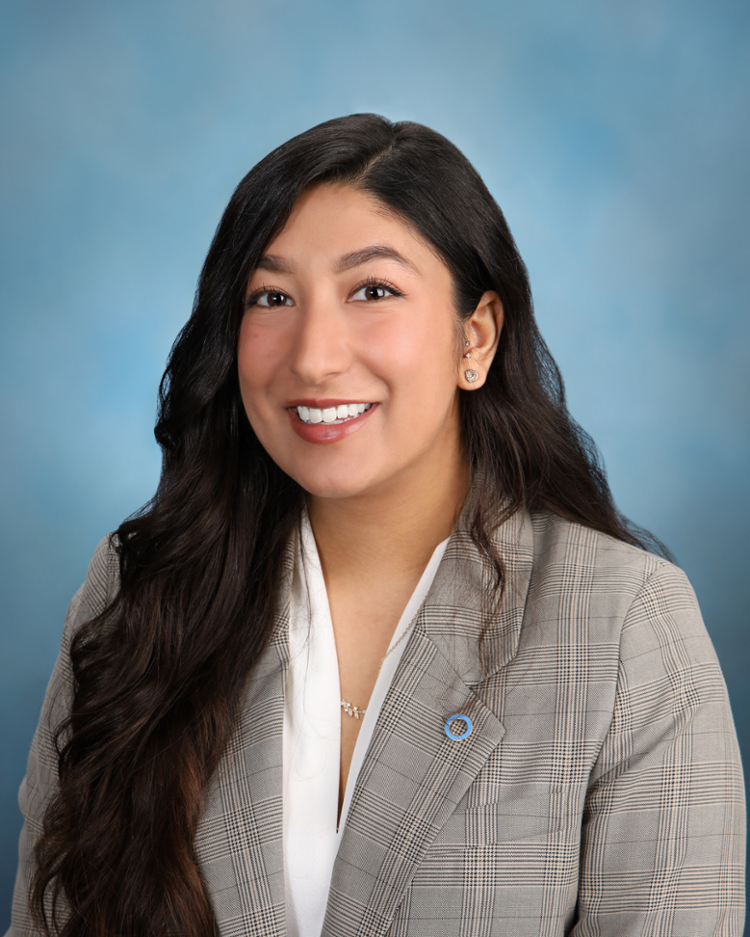Student Spotlight: Jasmine Maghera, recipient of the 2023 Vanier Canada Graduate Scholarship
31 August 2023

PhD student Jasmine Maghera receives the 2023 Vanier Canada Graduate Scholarship
Jasmine Maghera, PhD student in the Department of Pharmacology, has been awarded a 2023 Vanier Canada Graduate Scholarship from the Canadian Institutes of Health Research. She works with the Alberta Diabetes Institute (ADI) in the MacDonald Islet Biology Laboratory, helping lay down foundational knowledge toward a better treatment for Type 1 diabetes (T1D).
An alumna of the University of Alberta, Maghera earned a bachelor of science with a specialization in pharmacology in 2019 and switched from a master’s degree program to her PhD in 2022.
Maghera lives with T1D and knows first-hand that managing the disease isn’t easy. Not only are there health and lifestyle concerns, but it is “incredibly expensive to fund the devices you need to live a healthy life,” says Maghera, who had considered leaving academia to pursue a career elsewhere to more easily cover her health-care costs.
We contacted Maghera to find out more about her passion for finding a better treatment for T1D, how she’s helping other students living with the disease, and what being awarded a Vanier scholarship means to her.
What inspired you to pursue a PhD?
My journey towards pursuing a PhD has been shaped by a diverse range of experiences. Beginning with a background in glycan chemistry and then epilepsy research studying potassium channels, I found myself fascinated with stem-cell derived β-cells (SCβs) for the treatment of Type 1 diabetes (T1D). The rapid advancements within the stem-cell field, especially in the last few years addressing T1D, have ignited a desire in me to contribute meaningfully to the refinement of these cells. Science has been a lifelong interest, and the curiosity that continually prompts me to ask 'why' has stuck with me for as long as I can remember, so this was a natural progression in my career. My goal is to contribute to a future where T1D patients can find relief.
Please tell us about your work at the ADI.
T1D occurs when the insulin-producing cells in the pancreas become damaged and cannot adequately produce insulin, so people living with T1D must exogenously administer insulin to survive using multiple daily injections or pump therapy. Too much or too little insulin can be deadly and there is a subset of people that require transplantation to survive. However, donor tissues where these cells are taken from remain limited. Under the guidance of my supervisor, Dr. Patrick MacDonald, my work focuses on understanding the differences between SCβs and human β-cells to learn how to make better cells for transplantation to circumvent the limited donor-tissue supply.
I use a technique called patch clamping, which shows us the electrical behaviours of cells. This has been instrumental in understanding the upstream events that regulate insulin release in both stem-cell derived β-cells and human primary β-cells in real time. After we know this information, we can sequence cells to know both how they function and why. In the last few years, AI and machine learning have allowed us to process larger data sets, so this information will be easier to understand than ever before.
What motivated you to pursue this area of research?
Living with the disease myself for the last 15 years has been the route of my research because it allowed me to interact with others facing the same challenges and other, more complex challenges. It is exciting that I have the power now to make a real difference in our community because I hold a unique position as both patient and scientist.
What does your project to support students with diabetes entail?
Diabetes imposes significant health challenges and financial burdens, especially for students. I have collaborated with Jamie Boisvenue and Dr. Rose Yeung from the Reshape T1D team and the ADI to develop equitable funding opportunities for students living with diabetes.
Inspired by the Reshape T1D study data and using art as a conversational medium, we aim to build an art collection reflecting T1D lived experiences in Alberta, auctioning pieces for the fund. This effort provides financial support while teaching people about T1D. Our goal is to empower students by ensuring access to vital supplies such as insulin and glucose monitors and to remove some of the financial constraints on their pursuit of academic excellence.
What does it mean to you to win the Vanier scholarship?
Earning the Vanier scholarship is an incredible privilege. I could not do it without the village that has been an unwavering pillar of support, bolstering me through challenges and triumphs alike. This includes the incredible online diabetes community and organizations such as I Challenge Diabetes and Kids ’n’ Us.
The Vanier scholarship has afforded me significant time to focus on my research more intensely or pursue other ventures — such as the Reshape TD1 art collection — rather than be worried about how I will pay for my diabetes supplies.
What are your plans for the future?
I’m not sure about my exact plans, but I see myself working and advocating about a problem I am passionate about to help spur some change.
I’ve also always found myself drawn to business; like science, business ventures require risk and creativity to maximize output while ensuring everyone on the team has a reason to put their time into the goal. I enjoy figuring out how everyone can benefit and make lasting impacts, so I see myself keeping the doors open to potential intersections of my scientific journey with business and innovation.